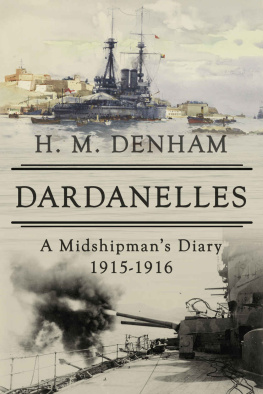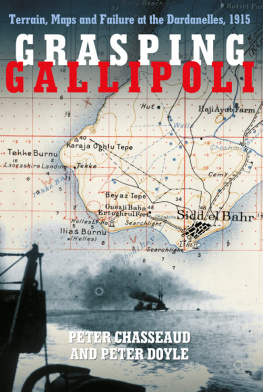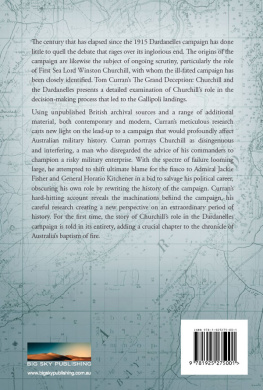H. M. Denham - Dardanelles: A Midshipmans Diary, 1915-16 (The History of World War One)
Here you can read online H. M. Denham - Dardanelles: A Midshipmans Diary, 1915-16 (The History of World War One) full text of the book (entire story) in english for free. Download pdf and epub, get meaning, cover and reviews about this ebook. year: 2021, publisher: Sapere Books, genre: Non-fiction. Description of the work, (preface) as well as reviews are available. Best literature library LitArk.com created for fans of good reading and offers a wide selection of genres:
Romance novel
Science fiction
Adventure
Detective
Science
History
Home and family
Prose
Art
Politics
Computer
Non-fiction
Religion
Business
Children
Humor
Choose a favorite category and find really read worthwhile books. Enjoy immersion in the world of imagination, feel the emotions of the characters or learn something new for yourself, make an fascinating discovery.
- Book:Dardanelles: A Midshipmans Diary, 1915-16 (The History of World War One)
- Author:
- Publisher:Sapere Books
- Genre:
- Year:2021
- Rating:4 / 5
- Favourites:Add to favourites
- Your mark:
- 80
- 1
- 2
- 3
- 4
- 5
Dardanelles: A Midshipmans Diary, 1915-16 (The History of World War One): summary, description and annotation
We offer to read an annotation, description, summary or preface (depends on what the author of the book "Dardanelles: A Midshipmans Diary, 1915-16 (The History of World War One)" wrote himself). If you haven't found the necessary information about the book — write in the comments, we will try to find it.
H. M. Denham: author's other books
Who wrote Dardanelles: A Midshipmans Diary, 1915-16 (The History of World War One)? Find out the surname, the name of the author of the book and a list of all author's works by series.
Dardanelles: A Midshipmans Diary, 1915-16 (The History of World War One) — read online for free the complete book (whole text) full work
Below is the text of the book, divided by pages. System saving the place of the last page read, allows you to conveniently read the book "Dardanelles: A Midshipmans Diary, 1915-16 (The History of World War One)" online for free, without having to search again every time where you left off. Put a bookmark, and you can go to the page where you finished reading at any time.
Font size:
Interval:
Bookmark:
DARDANELLES
A Midshipmans Diary, 1915-16
H. M. Denham

TABLE OF CONTENTS

PREFACE
There comes a time when one decides upon disposing of ones collection of old documents, reports and diaries. I was recently busy with the destruction of First World War diaries when a friend of mine, Simon Young, intervened and asked to see anything I might have not yet destroyed. I made a summary of the remaining copies concerning mostly my antics at the Dardanelles in 1915-16, but this summary was not good enough and I was asked for an exact copy of the original diaries. All italic sections are my additional comments on the diary to help give the reader some further information.
My first volume of the diary having already been destroyed, I have written a summary of earlier events leading up to the surviving diary when I went to the Dardanelles.
I am grateful to Miss Zillah Pettitt for the improvement in my line drawings done at the time of making notes for the diary; to Mr Michael Crookshank, son of our popular Lt Crookshank, for his help with his fathers records; to Dr Ronald Hope (Marine Society); to Mr George Millar; to Mr John Paton (Commonwealth War Graves Commission); to Lt-Comdr W. Ratcliffe; to Rear-Admiral Dalrymple Smith for refreshing my memory on gunnery problems; and to Rear-Admiral Dunbar-Nasmith for helping me to check his fathers records.
H.M.D.
PROLOGUE: JOINING AGAMEMNON
August 1914 saw me in my last term at the Royal Naval College, Dartmouth. All that term there had been a sense of foreboding: we knew that war with Germany lay close ahead. On Saturday, August 1st, at 4 p.m. came the Admiralty telegram Mobilise. We were spread all over the playing fields and the news was greeted by us 420 cadets with a resounding cheer: at last we were to fight the Germans. We ran to our college dormitories to pack our sea-chests ready for transport to various warships. There was no confusion as we already knew our ships and where to join them. Soon the market carts, already alerted in the countryside, began to arrive and were carrying our chests down to Dartmouth and across to the waiting trains at Kingswear Station.
It was all tremendously exciting for us young cadets and, as my train steamed along the river bank of the Dart on its way to Devonport, I felt a nostalgia for those happy sailing days in the Black Cutters and Montague whalers. Soon we were passing the old three-decker Britannia , whose decks I had often explored, and I remembered the occasion when I had climbed up the rigging and for a bet reached the truck of the fore topgallant mast.
I was one of the sixteen-year-olds who, following Mr Gieves advice in his booklet How to Become a Naval Officer , had been made to take the plunge at twelve and a half and to don naval uniform for our two years training at Osborne Naval College and a further two at Dartmouth. Our years at Dartmouth had been much the happier and as the months passed we had realised that a war with Germany was surely in the offing and had frequently discussed, with some relish, the part we might have to play.
I had been appointed to one of the last of the Victorian battleships, Exmouth , reported to be lying at Devonport; but when we reached Devonport, Exmouth was not to be found in port and we were accommodated in the barracks where we discussed the impending war. It was generally believed that war could not last longer than three weeks and our fear was that we might miss the chance of fighting.
TUESDAY, AUGUST 4TH. At 11 p.m. Great Britain declared war on Germany and early the following morning we left Devonport by train for Portland hoping to find Exmouth . Arriving that afternoon we reported to the dockyard, only to find that Exmouth had sailed that very morning. However, Agamemnon s picket-boat came alongside and took us on board; this ship turned out to be our war appointment. We were 12 cadets, and already there were four midshipmen and six sub-lieutenants altogether 22 in our mess in the gunroom. (This was a reasonably spacious compartment, with two scuttles (portholes) permitting daylight where we ate, worked, read and wrote our letters. We slept in our hammocks in the adjoining chest flat.)
Having deluded ourselves into thinking we had attained some level of importance as the senior cadets at Dartmouth we now came down to earth with a tremendous bump. This strange contrast in our daily life afloat began by tumbling out of our hammocks at 5.30 a.m. to double bare-footed round the upper deck.
We were chased around all day learning something of our duties, action stations and boat work. All the while we were made to feel we were the scum of the earth, known to the sub-lieutenants as the warts.
A certain amount of mild bullying in the form of evolutions took place in the gunroom occasionally at dinner during our early weeks on board. This was very unpleasant. Evolutions will be well remembered by my contemporaries at sea during this period. Such terms as Breadcrumbs, Dogs of War, Fork in the Beam and Angostura Trail will come to mind. Evolutions were devised so that the unfortunate warts could be beaten hard on the backside with a dirk-scabbard by the senior sub-lieutenant. This traditional form of bullying had died out before the end of the War.
When off duty we spent most of our time between decks either in the gunroom or the adjoining chest flat. In our sea-chests were all our clothes and belongings just as they had been during our four years at Osborne and Dartmouth. It was therefore most annoying and discomforting for us when we learnt quite suddenly that Admiralty, on account of fire risks, had ordered all midshipmens chests to be landed. Messrs Gieve, outfitters of almost every naval officer, undertook to store the chests for the duration of the War and to replace them with tin cases which, of course, were most inconvenient. Our pay remained at 1s/9d per day, but Admiralty paid us also 1s as messing allowance.
Agamemnon , generally known to the sailors as Aggie , was the last of the old broadside battleships and though laid down in 1903 before the revolutionary centre-line turret Dreadnought , she was actually in service after her, having taken three years until she could be commissioned. A 12-in. armour belt gave her excellent protection, but her speed was only 18 knots. She was the last heavy ship to have reciprocating engines.
From early August until December 31st Agamemnon , together with the rest of the Channel fleet, patrolled the Channel to cover the passage of the Expeditionary Force to France. To cover against what? No one could explain. There was no sign of the enemy until New Years Day 1915 when our first tragedy of war at sea gave us a nasty jolt.

Agamemnon : main and secondary armament
On Friday January 1st 1915 , during the early hours of a dark rough night, the fleet was off Lyme Bay steaming at 10 knots on a westerly course. I was called at a quarter to midnight to keep the Middle Watch and I remember tumbling out of my hammock to find the ship rolling about so much that I was nearly seasick. At 2.15 our next astern the old battleship Formidable suddenly hauled out of the line to port and the cruiser Diamond on the flank turned with her. There was no signal and, I remember at the time, no cause for alarm. Meanwhile the wind was increasing to gale force 9 and the barometer fell to 28.8 in. At 3.20 rockets were seen, apparently from Formidable . Twenty minutes passed. Then the Admiral signalled Raise steam for 17 knots and soon the fleet was heading for Portland, entering harbour at 8.15 a.m. At 11.15 a.m. Topaze came into harbour with her fore topgallant mast blown away and with 43 survivors of Formidable on board. This was our first authentic news of the disaster.
Next pageFont size:
Interval:
Bookmark:
Similar books «Dardanelles: A Midshipmans Diary, 1915-16 (The History of World War One)»
Look at similar books to Dardanelles: A Midshipmans Diary, 1915-16 (The History of World War One). We have selected literature similar in name and meaning in the hope of providing readers with more options to find new, interesting, not yet read works.
Discussion, reviews of the book Dardanelles: A Midshipmans Diary, 1915-16 (The History of World War One) and just readers' own opinions. Leave your comments, write what you think about the work, its meaning or the main characters. Specify what exactly you liked and what you didn't like, and why you think so.









